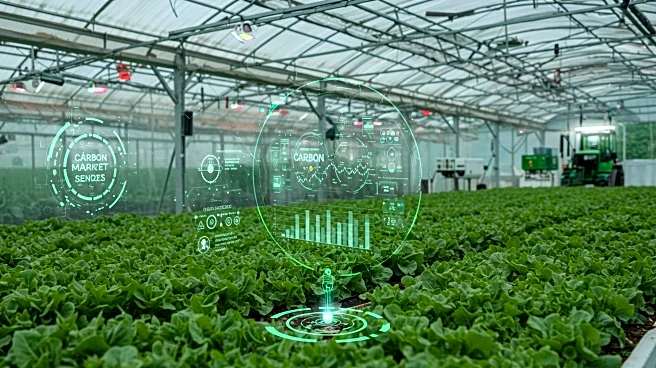What's Happening?
India is advancing its carbon markets agriculture, aiming to sequester 15 million tonnes of CO₂ by 2025 through sustainable farming and forestry practices. This initiative is part of a broader effort to combat climate change by integrating carbon markets with agriculture, offering farmers new income streams while enhancing carbon sequestration. The approach includes practices like no-till farming, cover cropping, and agroforestry, which are designed to reduce emissions and increase carbon storage in soil and vegetation. The initiative is supported by government policies, private sector pilots, and digital platforms like Farmonaut, which provide satellite insights and traceability to empower farmers.
Why It's Important?
India's carbon markets agriculture represents a significant opportunity for farmers, particularly smallholders, to participate in global carbon markets and benefit financially from sustainable practices. By adopting climate-smart techniques, farmers can improve productivity, restore degraded soil, and build resilience against climate change. This initiative not only addresses the urgent need for climate action but also supports rural livelihoods by providing additional income streams. The success of this program could serve as a model for other countries looking to integrate agriculture with carbon markets.
What's Next?
As India continues to develop its agriculture carbon sequestration market, the focus will be on scaling up participation and ensuring equitable access for smallholder farmers. This will involve enhancing measurement, reporting, and verification (MRV) systems through digital technology and satellite monitoring. The government and private sector are expected to expand support for climate-smart practices and carbon market mechanisms, potentially leading to increased integration of technology and green finance. By 2025, millions of Indian farmers could be participating in carbon markets, contributing to climate change mitigation and improved livelihoods.
Beyond the Headlines
The initiative highlights the potential for technology to transform agriculture and carbon markets, making them more accessible and efficient. The use of satellite analytics and AI-powered monitoring can lower costs and boost trust in carbon markets, enabling large-scale participation. This approach also underscores the importance of aligning agricultural practices with climate goals, offering a pathway to sustainable development.











